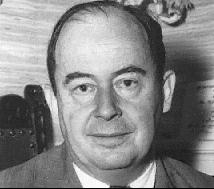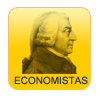John von Neumann, 1903-1957
John von Neumann (su nombre en hÚngaro es Margittai Neumann JÃĄnos Lajos) es un matemÃĄtico hÚngaro considerado por muchos como la mente mÃĄs genial del siglo XX, comparable solo a la de Albert Einstein.

A pesar de ser completamente desconocido para el "hombre de la calle", la trascendencia prÃĄctica de su actividad cientÃfica puede vislumbrarse al considerar que participÃģ activamente en el Proyecto Manhattan, el grupo de cientÃficos que creÃģ la primera bomba atÃģmica, que participÃģ y dirigiÃģ la producciÃģn y puesta a punto de los primeros ordenadores o que, como cientÃfico asesor del Consejo de Seguridad de los Estados Unidos en los aÃąos cincuenta, tuvo un papel muy destacado (aunque secreto y no muy bien conocido) en el diseÃąo de la estrategia de la guerra frÃa. Nicholas Kaldor dijo de ÃĐl "Es sin duda alguna lo mÃĄs parecido a un genio que me haya encontrado jamÃĄs".
NaciÃģ en Budapest, HungrÃa, hijo de un rico banquero judÃo. Tuvo una educaciÃģn esmerada. Se doctorÃģ en matemÃĄticas por la Universidad de Budapest y en quÃmicas por la Universidad de Zurich. En 1927 empezÃģ a trabajar en la Universidad de BerlÃn. En 1932 se traslada a los Estados Unidos donde trabajarÃĄ en el Instituto de Estudios Avanzados de Princeton.
Sus aportaciones a la ciencia econÃģmica se centran en dos campos:
Es el creador del campo de la TeorÃa de Juegos. En 1928 publica el primer artÃculo sobre este tema. En 1944, en colaboraciÃģn con Oskar Morgenstern, publica la Theory of Games and Economic Behavior. La teorÃa de juegos es un campo en el que trabajan actualmente miles de economistas y se publican a diario cientos de pÃĄginas. Pero ademÃĄs, las formulaciones matemÃĄticas descritas en este libro han influido en muchos otros campos de la economÃa. Por ejemplo, Kenneth Arrow y Gerard Debreu se basaron en su axiomatizaciÃģn de la teorÃa de la utilidad para resolver problemas del Equilibrio General.
En 1937 publica A Model of General Economic Equilibrium", del que E. Roy Weintraub dijo en 1983 ser "el mÃĄs importante artÃculo sobre economÃa matemÃĄtica que haya sido escrito jamÃĄs". En ÃĐl relaciona el tipo de interÃĐs con el crecimiento econÃģmico dando base a los desarrollos sobre el "crecimiento Ãģptimo" llevado a cabo por Maurice Allais, Tjalling C. Koopmans y otros.
Obras de John von Neumann de especial interÃĐs en la economÃa
- "Zur Theorie der Gessellshaftspiele", Mathematische Annalen 1928.
- "A Model of General Economic Equilibrium", 1937, en K. Menger, editor,Ergebnisse eines mathematischen Kolloquiums, 1935-36. (en inglÃĐs en RES, 1945).
- Theory of Games and Economic Behavior, en colaboraciÃģn con O. Morgenstern, 1944.
- "A Communications on the Borel Notes", 1953, Econometrica
- "Solutions of Games by Differential Equations", con G.W. Brown, 1953, en Kuhn y Tucker, editores, Contributions to Theory of Games, Vol. I.
- "Two Variants of Poker" con D.B. Gillies y J.P. Mayberry, 1953, en Kuhn y Tucker, editores, Contributions to Theory of Games, Vol. I.
- "A Numerical Method to Determine Optimum Strategy", 1954, Naval Research Logistics Quarterly
- The Computer and the Brain, 1958
Reproducimos a continuaciÃģn la bibliografÃa elaborada por el profesor Antonio RoldÃĄn BÃĄez, en el marco de su obra CATÃLOGO DE ECONOMÃA POLÃTICA ( 1.621 â 2.004 ).
Enviar comentarios directamente a a_roldan en
uma.es
VON NEUMANN, JOHN (MARGITTAI
NEUMANN JÃNOS LAJOS)
[ 1903 â 1957 ] [ Budapest, Imperio Austro-HÚngaro (hoy HungrÃa) ]
( EconomÃa MatemÃĄtica. TeorÃa de juegos )
(1926): Az ÃĄltalÃĄnos halmazelmÃĐlet axiomatikus felÃĐpÃtÃĐse, Budapest,
1926.
[Tesis doctoral del autor: Universidad de Budapest, 1926].
(1932): Mathematical foundations of quantum mechanics [Fundamentos
matemÃĄticos de la mecÃĄnica cuÃĄntica] [Mathematische grundlagen der
quantenmechanik. Mit 4 abbildungen] [Les fondements mathÃĐmatiques de la
mÃĐcanique quantique] [I fondamenti matematici della meccanica quantistica];
versiÃģn inglesa de ROBERT THOMAS BEYER; The University Press [Investigations in
physics; 2], Princeton (Nueva Jersey), 1955; reimpr., 1971. [FC DGG530.14/NEU/mat]
[VersiÃģn espaÃąola, anotada aparte (1949)].
[1Š ed. alemana: J. Springer (Die grundlehren der mathematischen wissenschaften
in einzeldarstellungen mit besonderer berÞcksichtigung der anwendungsgebiete;
38), BerlÃn, 1932; reimpr. 2Š ed.: 1996. 1Š ed. americana: Dover Publications,
Nueva York, 1943].
(1935): Charakterisierung des spektrums eines integraloperators, Hermann
et Cie. [ActualitÃĐs scientifiques et industrielles; 229; 20 p.], ParÃs, 1935.
(1936-37): Continuous geometry, 3 partes en 2 vols., The Institute for
Advanced Study, Princeton (Nueva Jersey), 1936-1937.
[Otra ed., con un prÃģlogo, a cargo de ISRAEL HALPERIN: The University Press (Princeton
mathematical series; 25), Princeton, 1960].
(1944): Theory of games and economic behavior [Spieltheorie und
wirtschaftliches verhalten] [ThÃĐorie des jeux et comportement ÃĐconomique]; con
OSKAR MORGENSTERN; 3Š ed. (1953), reimpr., The University Press, Princeton
(Nueva Jersey), 1980. [FD 330/207] [FC 519.83/NEU/the: 3Š ed., reimpr. 1974] [FE
5/802: 3Š ed., reimpr. 1970] [FE 7/979] [FE 8/316] [FC BQ519.83/NEU/the]
[Ed. del 60š aniversario, con una introducciÃģn de HAROLD W. KUHN y un epÃlogo de
ARIEL RUBINSTEIN: The University Press, Princeton, 2004].
(1946): Preliminary discussion of the logical design of an electronic
computing instrument. Part I, I, con ARTHUR WALTER BURKS y HERMAN HEINE
GOLDSTINE [Report prepared for U. S. Army Ordnance Department under Contract
W-36-034-ORD-7481; 42 p.]; The Institute for Advanced Study, Princeton (Nueva
Jersey), 1946 (vol. 1).
(1946-48): Planning and coding of problems for an electronic computing
instrument, con HERMAN HEINE GOLDSTINE [Report prepared for U. S. Army
Ordnance Department under Contract W-36-034-ORD-7481]; The Institute for
Advanced Study, Princeton (Nueva Jersey), 1946 (vol. 2); 1947 (vol. 3: Part II,
I; 69 p.); 1948 (vol. 4: Part II, II; 68 p.); 1948 (vol. 5: Part II, III; 23
p.).
(1947): The works of the mind, by Mortimer J. Adler [et al.], coautor;
editado por ROBERT B. HEYWOOD para The Committee on Social Thought [Papers
offered as a set of lectures at the University of Chicago during 1946]; con un
prefacio de JOHN U. NEF; The University Press, Chicago (Illinois), 1947.
[Contiene su contribuciÃģn: âThe mathematicianâ, p. 180-196].
(1949): Fundamentos matemÃĄticos de la mecÃĄnica cuÃĄntica [Mathematische
grundlagen der quantenmechanik] [Mathematical foundations of quantum mechanics]
[Les fondements mathÃĐmatiques de la mÃĐcanique quantique]; versiÃģn espaÃąola de R.
ORTIZ; Instituto Jorge Juan [MonografÃas de matemÃĄtica; 1], Madrid, 1949. [FC
DGG530.14/NEU/mat: inglÃĐs]
[2Š ed., con una introducciÃģn de JOSà MANUEL SÃNCHEZ RON: Consejo Superior de
Investigaciones CientÃficas (Textos universitarios CSIC; 9), Madrid, 1991].
(1950): Functional operators, 2 vols., The University Press [Annals of
mathematics studies; 21-22], Princeton (Nueva Jersey), 1950:
Volumen 1: Measures and integrals.
Volumen 2: The geometry of orthogonal spaces.
(1950): Contributions to the theory of games, vol. 1, coautor; editado
por HAROLD WILLIAM KUHN y ALBERT WILLIAM TUCKER; The University Press [Annals of
mathematics studies; 24], Princeton (Nueva Jersey), 1950.
[Contiene su contribuciÃģn conjunta, con G. W. BROWN: âSolutions of games by
differential equationsâ, p. 73-79].
(1951): Cerebral mechanisms in behaviour: The Hixon symposium, coautor;
editado por LLOYD A. JEFFRESS; [Report of a Symposium held at the California
Institute of Technology in September, 1948, under the auspices of the Hixon Fund
Committee]; John Wiley, Nueva York, 1951.
[Contiene su contribuciÃģn: âThe general and logical theory of automataâ, p.
1-31].
[1952]: Lectures on probabilistic logics and the synthesis of reliable
organisms from unreliable components / delivered by J. Von Neumann at the
California Institute of Technology, January 4-15, 1952, con anotaciones de
RICHARD S. PIERCE; California Institute of Technology, Pasadena (California),
[1952].
(1953): Contributions to the theory of games, vol. 2, coautor; editado
por HAROLD WILLIAM KUHN y ALBERT WILLIAM TUCKER; The University Press [Annals of
mathematics studies; 28], Princeton (Nueva Jersey), 1953.
[Contiene sus contribuciones: âA certain zero-sum two-person game equivalent to
the optimal assignment problemâ, p. 5-12; y âTwo variants of pokerâ, con DONALD
B. GILLIES y J. P. MAYBERRY, p. 13-50].
(1955): Geometry of complex domains: A seminar conducted by Professors Oswald
Veblen and John Von Neumann, 1935-36, The Institute for Advanced Study,
Princeton (Nueva Jersey), 1955.
(1955): The unity of knowledge, coautor; editado por LEWIS GASTON LEARY;
Doubleday, Garden City (Nueva York), 1955.
[Contiene su contribuciÃģn: âMethod in the physical sciencesâ, p. 157-164].
(1956): Automata studies, coautor; editado por CLAUDE ELWOOD SHANNON y
JOHN McCARTHY; con contribuciones de WILLIAM ROSS ASHBY [et al.]; The University
Press (Annals of mathematics studies; 34), Princeton (Nueva Jersey), 1956.
[Contiene su contribuciÃģn: âProbabilistic logics and the synthesis of reliable
organisms from un-reliable components. January 1952, California Institute of
Technology. Lecture notes taken by R. S. Pierce and revised by the authorâ, p.
43-98].
(1958): El ordenador y el cerebro / John von Neumann [The computer and
the brain] [L'ordinateur et le cerveau]; Bon Ton, Barcelona, 1999.
[1Š ed. inglesa: Yale University Press (Mrs. Hepsa Ely Silliman memorial
lectures), New Haven (Connecticut), 1958; 2Š ed., con prÃģlogo de PAUL M.
CHURCHLAND y PATRICIA S. CHURCHLAND: Yale Nota Bene, New Haven, 2000]. [FC F519/NEU/com:
1Š ed., 6Š reimpr., 1967]
(1961-63): Collected works / John von Neumann, 6 vols., editor general:
ABRAHAM HASKEL TAUB; Macmillan [A Pergamon Press book], Nueva York, 1961-1963:
Volumen 1: Logic, theory of sets and quantum mechanics.
Volumen 2: Operators, ergodic theory and almost periodic functions in a group.
Volumen 3: Rings of operators.
Volumen 4: Continuous geometry and other topics.
Volumen 5: Design of computers, theory of automata and numerical analysis.
Volumen 6: Theory of games, astrophysics, hydrodynamics and meteorology.
(1966): Theory of self-reproducing automata / John von Neumann, editado y
completado por ARTHUR WALTER BURKS; University of Illinois Press, Urbana
(Illinois), 1966.
(1971): Contributions to the Von Neumann growth model: Proceedings of a
Conference organized by the Institute for Advanced Studies, Vienna, Austria,
July 6 and 7, 1970, editado por GERHART BRUCKMANN y WILHELM WEBER; Springer-Verlag,
Viena, 1971. [FE 7/1240]
(1980): John von Neumann and Norbert Wiener: From mathematics to the
technologies of life and death / Steve J. Heims, The MIT Press, Cambridge (Massachusetts),
1980.
(1981): Continuous geometries with a transition probability / John von
Neumann, editado y preparado por ISRAEL HALPERIN; American Mathematical Society
[Memoirs of the American Mathematical Society; 252], Providence (Rhode Island),
1981.
[Nota: Reproduce el referido manuscrito del autor de 1937].
(1983): Leben und werk von John von Neumann: Ein zusammenfassender Þberblick
[Neumann JÃĄnos ÃĐlete ÃĐs munkÃĄssÃĄga]; editado por TAMÃS LEGENDI y TIBOR
SZENTIVANYI; Bibliographisches Institut, Mannheim, 1983.
(1987): Papers of John von Neumann on computing and computer theory,
editado por WILLIAM ASPRAY y ARTHUR WALTER BURKS; The MIT Press [Charles Babbage
Institute reprint series for the history of computing; 12], Cambridge (Massachusetts),
1987.
(1987): John von Neumann as seen by his brother / Nicholas A. Vonneuman,
ed. rev., N. A. Vonneuman, Meadowbrook (Pensilvania), 1987.
(1989): John von Neumann and modern economics, editado por MOHAMMED DORE,
SUKHAMOY CHAKRAVARTY, y RICHARD MURPHEY GOODWIN; Clarendon Press, Oxford
(Inglaterra), 1989.
(1990): John von Neumann y los orÃgenes de la computaciÃģn moderna /
William Aspray [John von Neumann and the origins of modern computing]; Gedisa,
Barcelona, 1993. [FL P-10/2/18]
[1Š ed. inglesa: The MIT Press (History of computing), Cambridge (Massachusetts),
1990].
(1990): The legacy of John Von Neumann, editado por JAMES GLIMM, JOHN
IMPAGLIAZZO e ISADORE SINGER; American Mathematical Society [Proceedings of
Symposia in Pure Mathematics; 50], Providence (Rhode Island), 1990. [FC A51/leg]
[FC ATR/51/leg]
(1992): John von Neumann / Norman Macrae [John von Neumann: Mathematik
und computerforschung - Facetten eines genies]; Pantheon Books, Nueva York,
1992.
[1Š ed. alemana: BirkhÃĪuser (Lebensgeschichten aus der wissenschaft), Basilea,
1994].
(1995): The Neumann compendium, editado por F. BRÃDY y TIBOR VÃMOS; World
Scientific [World Scientific series in 20th century mathematics; 1], Singapur :
River Edge (Nueva Jersey), 1995.
(1996): ThÃĐorie gÃĐnÃĐrale et logique des automates / John Von Neumann. La
pensÃĐe et les machines: Le mÃĐcanisme algorithmique de John Von Neumann / GÃĐrard
Chazal, Champ Vallon, Seyssel, 1996.
[Contiene la versiÃģn francesa de âThe general and logical theory of automataâ
(1951)].
(1999): Invariant measures / John von Neumann, American Mathematical
Society, Providence (Rhode Island), 1999.
(2001): John von Neumann and the foundations of quantum physics, editado
por MIKLÃS RÃDEI y MICHAEL STÃLTZNER; Kluwer Academic [Vienna Circle Institute
yearbook; 8], Dordrecht (Holanda), 2001.
(2001): Landmark papers in economic fluctuations, economic policy, and
related subjects, [coautor]; editado, con una introducciÃģn, por LAWRENCE R.
KLEIN; con un prefacio de MARK BLAUG; Edward Elgar [The foundations of 20th
century economics; 2], Cheltenham (Reino Unido), 2002. [FE BA/2826]
[Contiene su contribuciÃģn: âA model of general economic equilibriumâ, cap. 20;
reimpr. (extraido de âReview of Economic Studiesâ, 13, 1945; p. 1-9). VersiÃģn
original alemana: âÃber ein Ãķkonomisches gleichungssystem und eine
verallgemeinerung des brouwerschen fixpunktsatzesâ, incluido en âErgebnisse
eines mathematischen kolloquiumsâ, editado por KARL MENGER: F. Deuticke, Leipzig,
1937; Heft 8, p. 73-83. Otra reciente ed., a cargo de EGBERT DIERKER y K.
SIGMUND, con prÃģlogo de GÃRARD DEBREU: Springer Verlag, Viena, 1998].
Otra exhaustiva bibliografÃa puede encontrarse en
http://www.info.omikk.bme.hu/tudomany/neumann/javnbibl.htm



| En eumed.net: |
 1647 - Investigaciones socioambientales, educativas y humanísticas para el medio rural Por: Miguel Ángel Sámano Rentería y Ramón Rivera Espinosa. (Coordinadores) Este libro es producto del trabajo desarrollado por un grupo interdisciplinario de investigadores integrantes del Instituto de Investigaciones Socioambientales, Educativas y Humanísticas para el Medio Rural (IISEHMER). Libro gratis |
15 al 28 de febrero |
|
| Desafíos de las empresas del siglo XXI | |
15 al 29 de marzo |
|
| La Educación en el siglo XXI | |




